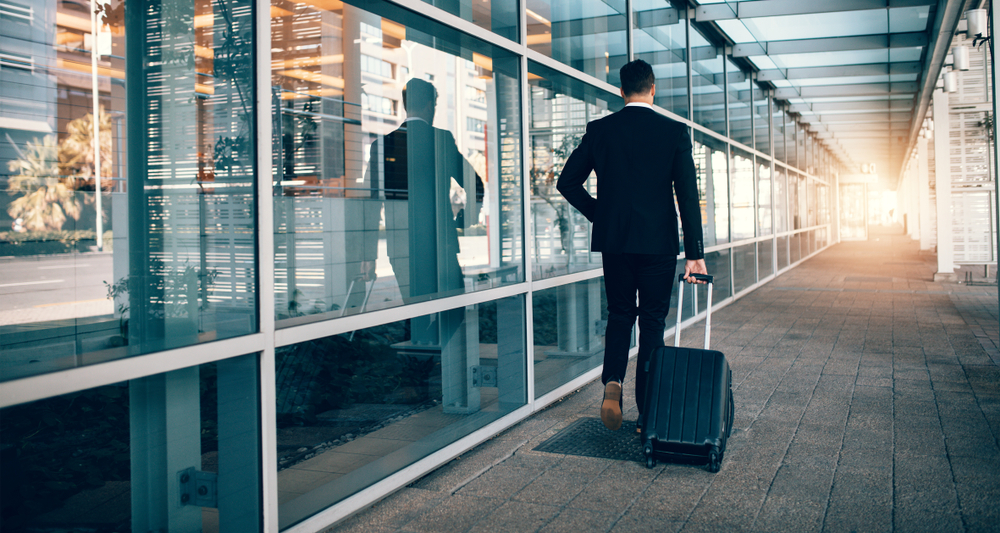Global business travel recovery witnesses double-digit surge since February

Business travel is surging forward, international travel is returning and despite new challenges, industry recovery is entrenched. In addition, corporate travel policies are undergoing a revamp and employees are broadly willing to travel for business. These findings are from the April Business Travel Recovery Poll, the latest and 27th in a series from the Global Business Travel Association (GBTA), the world’s premier association serving the business travel industry.
GBTA has been regularly surveying business travel buyers, suppliers, and other stakeholders around the world since the pandemic began to take the pulse of the industry as it navigates challenges and changes on the road to recovery.
“We’re seeing significant gains in the return of business travel, especially over the past month or two. GBTA’s global data shows more companies are allowing domestic and now also international employee travel. Booking levels and travel spending continue to return, and there’s high levels of optimism and employee willingness to travel for business. This comes even as the industry faces challenges beyond COVID-19 including rising fuel prices, inflation, supply chain disruption and war in Ukraine,” said Suzanne Neufang, CEO, GBTA.
Here are the results from GBTA’s April Business Travel Recovery poll:
- DOUBLE-DIGIT INCREASES, INTERNATIONAL TRAVEL JUMPS: Companies who report they at least sometimes allow non-essential domestic business travel has increased to 86%, up from 73% in GBTA’s February poll. International travel made a big jump with 74% reporting their company now allows it, up 26 percentage points from February.
- LESS CANCELLING, MORE TRAVELING: Companies continue to resume international business travel, with only 45% saying they have canceled or suspended most or all international business trips, 27 points less than the 71% in February. In addition, only one in five respondents (20%) report they have canceled or suspended most or all domestic business travel, compared to 33% in February.
Of the companies who previously cancelled or suspended most or all trips to a specific region/country, 75% plan to resume domestic travel and 52% international travel in the next one to three months.
- CORPORATE TRAVEL BOOKINGS RETURN: A majority (88%) of suppliers and travel management companies (TMCs) report their bookings have increased in the prior month. This is much higher than the share who said the same in February (45%). On average, travel buyers say their company’s travel bookings are currently at 56% of the pre-pandemic level, up 22 points from February.
- SPENDING RECOVERY FORECAST: When asked to characterize their company’s spending on business travel compared to 2019, on average, respondents expect their company will be back to 59% of their pre-pandemic spend by the end of 2022 and will reach 79% by the end of 2023.
- BACK IN THE OFFICE, BACK ON THE ROAD. Four in ten (41%) GBTA stakeholders say their company’s return to the office directly correlates to the return to business travel. Over half (55%) of respondents say their company has implemented a permanent back-to-office policy.
One-quarter (23%) report their employees will be full-time in-office, and over half (52%) will be hybrid with working days spent between office and home. Two-plus years into the pandemic, 26% report their company has not yet announced a permanent policy. An additional one in ten (12%) say employees will have the choice whether to return to the office or not.
- EMPLOYEE TRAVEL WILLINGNESS CLIMBS: Nine in ten (94%) GBTA buyers and procurement professionals feel their employees are “willing” or “very willing’ to travel for business in the current environment, up from 82% in the February poll. No respondent in any region of the world feels their employees are not willing to travel for business in the current environment.
- POLICIES CHANGING WITH THE TIMES: The pandemic forced many companies to rethink their business travel program. A majority (80%) of travel managers report the pandemic has driven changes to their company’s travel policies in some capacity, including:
- Fewer business trips overall: 39%
- Employees take fewer business trips, but with more goals assigned to each trip: 37%
- More trip approval requirements: 24%
- A re-evaluation of how employees travel for business (i.e., safety considerations, types of transport, sustainable hotel stays, etc.): 23%
- INFLATION’S IMPACT: Many companies are increasing their business travel spend in the wake of inflation. Forty-one percent report they have increased employee travel spending for air travel, 34% for hotel stays, 33% for car rentals and 26% for ride share and taxis.
- FACTORING IN SUSTAINABLE TRAVEL: Corporate travel managers recognize sustainability will impact their travel program. The most frequently cited expectations include fewer trips per employee overall (54%) and longer, multi-purpose business trips (43%) and more rail and multi-modal options (34%). However, most travel buyers (61%) do not expect their company will restrict the frequency of flying in business class.
European buyers (71%) are significantly more likely than their North America counterparts (47%) to say their plans will likely include fewer trips per employee, and they are more likely (59%) than North American buyers (36%) to say sustainability considerations will include longer trips.
- GETTING BACK THE KNACK FOR TRAVEL: As employees return to business travel, many have faced hurdles as they get back in the air and on the road. GBTA stakeholders most often report they and/or their colleagues have experienced confusion on travel restrictions/travel documentation (63%), are more anxious or stressed about business travel (45%) or have had challenges when navigating airports and security rules (36%).
- MASKS ON PLANES: WHO SHOULD DECIDE: Global sentiment around mask mandates on commercial airplanes varies. Two in five GBTA stakeholders (41%) say governments should require passengers to wear masks on airplanes, while a third (32%) feel each airline should be allowed to decide if passengers are required to wear masks. One in five (20%) feel governments should prohibit mask mandates (i.e., allow passengers to fly on any airline without masks).


Comments are closed.